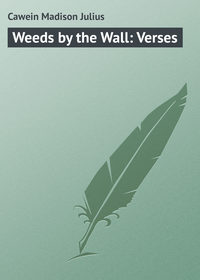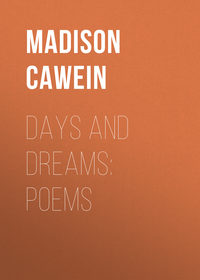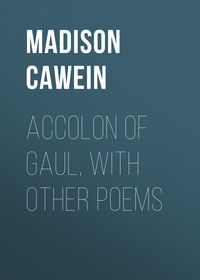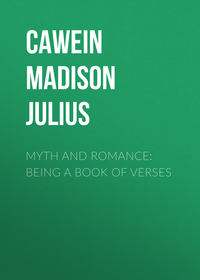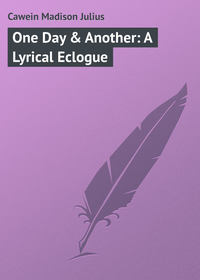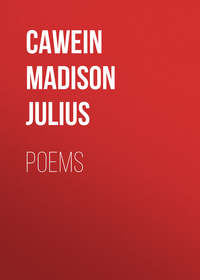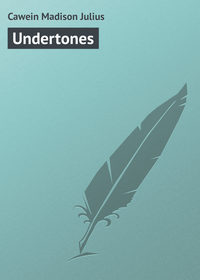The Poems of Madison Cawein. Volume 2 (of 5)
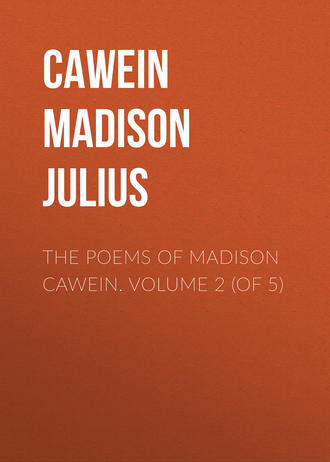 полная версия
полная версияThe Poems of Madison Cawein. Volume 2 (of 5)
Жанр: зарубежная поэзиязарубежная классиказарубежная старинная литературастихи и поэзиясерьезное чтениеcтихи, поэзия
Язык: Английский
Год издания: 2018
Добавлена:
Настройки чтения
Размер шрифта
Высота строк
Поля

Madison Julius Cawein
The Poems of Madison Cawein, vol. 2
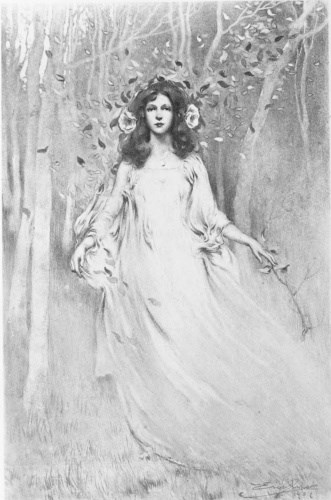
ONE DAY AND ANOTHER
PART I
LATE SPRING
I
Outside her garden. He waits musing:Herein the dearness of her is;The thirty perfect days of JuneMade one, in maiden lovelinessWere not more sweet to clasp and kiss,With love not more in tune.Ah me! I think she is too true,Too spiritual for life’s rough way:So say her eyes,—her soul looks through,—Two bluet blossoms, watchet-blue,Are not more pure than they.So kind, so beautiful is she,So soft and white, so fond and fair,Sometimes my heart fears she may beNot long for Earth, and secretlySweet sister to the air.II
Dusk deepens. A whippoorwill callsThe whippoorwills are calling whereThe golden west is graying;“’Tis time,” they say, “to meet him there—Why are you still delaying?“He waits you where the old beech throwsIts gnarly shadow overWood violet and the bramble rose,Frail lady-fern and clover.“Where elder and the sumac peepAbove your garden’s paling,Whereon, at noon, the lizards sleep,Like lichen on the railing.“Come! ere the early rising moon’sGold floods the violet valleys;Where mists, like phantom picaroonsAnchor their stealthy galleys.“Come! while the deepening amethystOf dusk above is falling—’Tis time to tryst! ’tis time to tryst!”The whippoorwills are calling.They call you to these twilight waysWith dewy odor dripping—Ah, girlhood, through the rosy hazeCome like a moonbeam slipping.III
He enters the garden, speaking dreamily:There is a fading inward of the day,And all the pansy sunset clasps one star;The twilight acres, eastward, glimmer gray,While all the world to westward smoulders far.Now to your glass will you pass for the last time?Pass! humming some ballad, I know.Here where I wait it is late and is past time—Late! and the moments are slow, are slow.There is a drawing downward of the night;The bridegroom Heaven bends down to kiss the moon:Above, the heights hang silver in her light;Below, the vales stretch purple, deep with June.There in the dew is it you hiding lawny?You? or a moth in the vines?—You!—by your hand! where the band twinkles tawny!You!—by your ring, like a glow-worm that shines!IV
She approaches, laughing. She speaks:You’d given up hope?HeBelieve me!SheWhy! is your love so poor?HeNo. Yet you might deceive me!SheAs many a girl before.—Ah, dear, you will forgive me?HeSay no more, sweet, say no more!SheLove trusts; and that’s enough, my dear.Trust wins through love; whereof, my dear,Love holds through trust: and love, my dear,Is—all my life and lore.HeCome, pay me or I’ll scold you.—Give me the kiss you owe.—You run when I would hold you?SheNo! no! I say! now, no!—How often have I told you,You must not use me so?HeMore sweet the dusk for this is,For lips that meet in kisses.—Come! come! why run from blissesAs from a dreadful foe?V
She stands smiling at him, shyly, then speaks:How many words in the asking!How easily I can grieve you!—My “yes” in a “no” was a-masking,Nor thought, dear, to deceive you.—A kiss?—the humming-bird happiness hereIn my heart consents.... But what are words,When the thought of two souls in speech accords?Affirmative, negative—what are they, dear?I wished to say “yes,” but somehow said “no.”The woman within me knew you would know,Knew that your heart would hear.He speaks:So many words in the doing!—Therein you could not deceive me;Some things are sweeter for the pursuing:I knew what you meant, believe me.—Bunched bells of the blush pomegranate, to fixAt your throat.... Six drops of fire they are....Will you look—where the moon and its following starRise silvery over yon meadow ricks?While I hold—while I bend your head back, so....For I know it is “yes” though you whisper “no,”And my kisses, sweet, are six.VI
Moths flutter around them. She speaks:Look!—where the fieryGlow-worm in brieryBanks of the moon-mellowed bowersSparkles—how hazilyPinioned and airilyDelicate, warily,Drowsily, lazily,Flutter the moths to the flowers.White as the dreamiestBud of the creamiestRose in the garden that dozes,See how they cling to them!Held in the heart of theirHearts, like a part of theirPerfume, they swing to themWings that are soft as a rose is.Dim as the forming ofDew in the warming ofMoonlight, they light on the petals;All is revealed to them;All!—from the sunniestTips to the honiestHeart, whence they yield to themSpice, through the darkness that settles.So to our tremulousSouls come the emulousAgents of love; through whose powerAll that is best in us,All that is beautiful,Selfless and dutiful,Is manifest in us,Even as the scent of a flower.VII
Taking her hand he says:What makes you beautiful?Answer, now, answer!—Is it that dutifulSouls are all beautiful?Is it romance orBeauty of spirit,Which souls, that merit,Of heaven inherit?—Have you an answer?She, roguishly:What makes you lovable?Answer, now, answer!—Is it not provableThat man is lovableJust because chance, orNature, makes womanLove him?—Her humanPart’s to illumine.—Have you an answer?VIII
Then, regarding him seriously, she continues:Could I recall every joy that befell meThere in the past with its anguish and bliss,Here in my heart it hath whispered to tell me,—They were no joys like this.Were it not well if our love could forget them,Veiling the Was with the dawn of the Is?Dead with the past we should never regret them,Being no joys like this.Now they are gone and the Present stands speechful,Ardent of word and of look and of kiss,—What though we know that their eyes are beseechful!—They were no joys like this.Were it not well to have more of the spirit,Living high Futures this earthly must miss?Less of the flesh, with the Past pining near it?Knowing no joys like this!IX
Leaving the garden for the lane. He, with lightness of heart:We will leave reason,Sweet, for a season:Reason were treasonNow that the netherSpaces are clad, oh,In silvery shadow—We will be glad, oh,Glad as this weather!She, responding to his mood:Heart unto heart! where the moonlight is slanted,Let us believe that our souls are enchanted:—I in the castle-keep; you are the airyPrince who comes seeking me; love is the fairyBringing us two together.HeStarlight in massesOver us passes;And in the grass isMany a flower.—Now will you tell meHow ’d you enspell me?What once befell meThere in your bower?SheSoul unto soul!—in the moon’s wizard glory,Let us believe we are parts in a story:—I am a poem; a poet you hear itWhispered in star and in flower; a spirit,Love, puts my soul in your power.X
He, suddenly and very earnestly:Perhaps we lived in the daysOf the Khalif Haroun er Reshid;And loved, as the story saysDid the Sultan’s favorite oneAnd the Persian Emperor’s son,Ali ben Bekkar, heOf the Kisra dynasty.Do you know the story?—Well,You were Haroun’s Sultana.When night on the palace fell,A slave, through a secret door,—Low-arched on the Tigris’ shore,—By a hidden winding stairBrought me to your bower there.Then there was laughter and mirth,And feasting and singing together,In a chamber of wonderful worth;In a chamber vaulted highOn columns of ivory;Its dome, like the irised skies,Mooned over with peacock eyes;Its curtains and furniture,Damask and juniper.Ten slave girls—so many blooms—Stand, holding tamarisk torches,Silk-clad from the Irak looms;Ten handmaidens serve the feast,Each maid like a star in the east;Ten lutanists, lutes a-tune,Wait, each like the Ramadan moon.For you, in a stuff of MervBlue-clad, unveiled and jeweled,No metaphor made may serve:Scarved deep with your raven hair,The jewels like fireflies there—Blossom and moon and star,The Lady Shemsennehar.The zone that girdles your waistWould ransom a Prince and Emeer;In your coronet’s gold enchased,And your bracelet’s twisted bar,Burn rubies of Istakhar;And pearls of the Jamshid raceHang looped on your bosom’s lace.You stand like the letter I;Dawn-faced, with eyes that sparkleBlack stars in a rosy sky;Mouth, like a cloven peach,Sweet with your smiling speech;Cheeks, that the blood presumesTo make pomegranate blooms.With roses of Rocknabad,Hyacinths of Bokhara,—Creamily cool and cladIn gauze,—girls scatter the floorFrom pillar to cedarn door.Then, a pomegranate bloom in each ear,Come the dancing-girls of Kashmeer.Kohl in their eyes, down the room,—That opaline casting-bottlesHave showered with rose-perfume,—They glitter and drift and swoonTo the dulcimer’s languishing tune;In the liquid light like starsAnd moons and nenuphars.Carbuncles, tragacanth-red,Smoulder in armlet and anklet:Gleaming on breast and on head,Bangles of coins, that are angled,Tinkle: and veils, that are spangled,Flutter from coiffure and wristLike a star-bewildered mist.Each dancing-girl is a flowerOf the Tuba from vales of El Liwa.—How the bronzen censers glower!And scents of ambergris pour,And of myrrh, brought out of Lahore,And of musk of Khoten! how goodIs the scent of the sandalwood!A lutanist smites her lute,Sings loves of Mejnoon and Leila:—Her voice is an Houri flute;—While the fragrant flambeaux wave,Barbaric, o’er free and slave,O’er fabrics and bezels of gemsAnd roses in anadems.Sherbets in ewers of gold,Fruits in salvers carnelian;Flagons of grotesque mold,Made of a sapphire glass,Brimmed with wine of Shirâz;Shaddock and melon and grapeOn plate of an antique shape.Vases of frosted rose,Of alabaster graven,Filled with the mountain snows;Goblets of mother-of-pearl,One filigree silver-swirl;Vessels of gold foamed upWith spray of spar on the cup.Then a slave bursts in with a cry:“The eunuchs! the Khalif’s eunuchs!—With scimitars bared draw nigh!Wesif and Afif and he,Chief of the hideous three,Mesrour!—the Sultan ’s seen’Mid a hundred weapons’ sheen!”Did we part when we heard this?—No!It seems that my soul remembersHow I clasped and kissed you, so....When they came they found us—dead,On the flowers our blood dyed red;Our lips together, andThe dagger in my hand.XI
She, musingly:How it was I can not tell,For I know not where nor why;But I know we loved too wellIn some world that does not lieEast or west of where we dwell,And beneath no earthly sky.Was it in the golden ages?—Or the iron?—that I heard,—In the prophecy of sages,—Haply, how had come a bird,Underneath whose wing were pagesOf an unknown lover’s word.I forget. You may rememberHow the earthquake shook our ships;How our city, one huge ember,Blazed within the thick eclipse:When you found me—deep DecemberSealed my icy eyes and lips.I forget. No one may sayThat such things can not be true:—Here a flower dies to-day,There, to-morrow, blooms anew....Death is silent.—Tell me, pray,Why men doubt what God can do?XII
He, with conviction:As to that, nothing to tell!You being all my belief,Doubt can not enter or dwellHere where your image is chief;Here where your name is a spell,Potent in joy and in grief.Is it the glamour of springWorking in us so we seemAye to have loved? that we clingEven to some fancy or dream,Rainbowing everything,Here in our souls, with its gleam?See! how the synod is metThere of the planets to preach us:—Freed from the earth’s oubliette,See how the blossoms beseech us!—Were it not well to forgetWinter and death as they teach us?Dew and a bud and a star,All,—like a beautiful thought,Over man’s wisdom how far!—God for some purpose hath wrought.—Could we but know why they are,And that they end not in naught!Stars and the moon; and they rollOver our way that is white.—Here shall we end the long stroll?Here shall I kiss you good night?Or, for a while, soul to soul,Linger and dream of delight?XIII
They reënter the garden. She speaks somewhat pensively:Myths tell of walls and cities, lyred of love,That rose to music.—Were that power my own,Had I that harp, that magic barbiton,What had I builded for our lives thereof?—In docile shadows under bluebell skies,A home upon the poppied edge of eve,Beneath pale peaks the splendors never leave,’Mid lemon orchards whence the egret flies.Where, pitiless, the ruined hand of deathShould never reach. No bud, no flower fade:Where all were perfect, pure and unafraid:And life serener than an angel’s breath.The days should move to music: song should tameThe nights, attentive with their listening stars:And morn outrival eve in opal bars,Each preaching beauty with rose-tongues of flame.O home! O life! desired and to be!How shall we reach you?—Far the way and dim.—Give me your hand, sweet! let us follow him,Love with the madness and the melody.XIV
He, observing the various dowers around them:Violets and anemonesThe surrendered HoursPour, as handsels, round the kneesOf the Spring, who to the breezeFlings her myriad flowers.Like to coins, the sumptuous dayStrews with blossoms goldenEvery furlong of his way,—Like a Sultan gone to prayAt a Kaaba olden.Warlock Night, with spark on spark,Clad in dim attire,Dots with stars the haloed dark,—As a priest around the ArkLights his lamps of fire.These are but the cosmic stringsOf the harp of Beauty,Of that instrument which sings,In our souls, of love, that bringsPeace and faith and duty.XV
She, seriously:Duty?—Comfort of the sinnerAnd the saint!—When grief and trialWeigh us, and within our innerSelves,—responsive to love’s viol,—Hope’s soft voice grows thin and thinner.It is kin to self-denial.Self-denial! Through whose feelingWe are gainer though we ’re loser;All the finer force revealingOf our natures. No accuserIs the conscience then, but healingOf the wound of which we ’re chooser.Who the loser, who the winner,If the ardor fail as preacher?—None who loved was yet beginner,Though another’s love-beseecher:Love’s revealment ’s of the innerLife and God Himself is teacher.Heine said “no flower knowethOf the fragrance it revealeth;Song, its heart that overfloweth,Never nightingale’s heart feeleth”—Such is love the spirit groweth,Love unconscious if it healeth.XVI
He, looking smilingly into her eyes, after a pause, lightly:An elf there is who stables the hotRed wasp that sucks on the apricot;An elf, who rowels his spiteful bay,Like a mote on a ray, away, away;An elf, who saddles the hornet leanAnd dins i’ the ear o’ the swinging bean;Who straddles, with cap cocked, all awry,The bottle-green back o’ the dragon-fly.And this is the elf who sips and sipsFrom clover-horns whence the perfume drips;And, drunk with dew, in the glimmering gloamAwaits the wild-bee’s coming home;In ambush lies where none may see,And robs the caravan bumblebee:Gold bags of honey the bees must payTo the bandit elf of the fairy-way.Another ouphen the butterflies know,Who paints their wings with the hues that glowOn blossoms: squeezing from tubes of dewPansy colors of every hueOn his bloom’s pied pallet, he paints the wingsOf the butterflies, moths, and other things.This is the elf that the hollyhocks hear,Who dangles a brilliant in each one’s ear;Teases at noon the pane’s green fly,And lights at night the glow-worm’s eye.But the dearest elf, so the poets say,Is the elf who hides in an eye of gray;Who curls in a dimple or slips alongThe strings of a lute to a lover’s song;Who smiles in her smile and frowns in her frown,And dreams in the scent of her glove or gown;Hides and beckons, as all may note,In the bloom or the bow of a maiden’s throat.XVII
She, pensively, standing among the flowers:Soft through the trees the night wind sighs,And swoons and dies.Above, the stars hang wanly white;Here, through the dark,A drizzled gold, the firefliesRain mimic stars in spark on spark.—’Tis time to part, to say good night.Good night.From fern to flower the night-moths crossAt drowsy loss.The moon drifts, veiled, through clouds of white;And pearly pale,In silvery blurs, through beds of moss,Their tiny moons the glow-worms trail.—’Tis time to part, to say good night.Good night.XVIII
He, at parting, as they proceed down the garden:You say we can not marry, nowThat roses and the June are here?To your decision I must bow.—Ah, well!—perhaps ’t is best, my dear.Let’s swear again each old love vowAnd love another year.Another year of love with you!Of dreams and days, of sun and rain!When field and forest bloom anew,And locust clusters pelt the lane,When all the song-birds wed and woo,I’ll not take “no” again.Oft shall I lie awake and markThe hours by no clanging clock,But, in the dim and dewy dark,Far crowing of some punctual cock;Then up, as early as the larkTo meet you by our rock.The rock, where first we met at tryst;Where first I wooed and won your love.—Remember how the moon and mistMade mystery of the heaven aboveAs now to-night?—Where first I kissedYour lips, you trembling like a dove.So, then, we will not marry nowThat roses and the June are here,That warmth and fragrance weigh each bough?And, yet, your reason is not clear …Ah, well! We ’ll swear anew each vowAnd wait another year.PART II
EARLY SUMMER
I
She delays, meditating. A rainy afternoonGray skies and a foggy rainDripping from streaming eaves;Over and over againDull drop of the trickling leaves:And the woodward-winding lane,And the hill with its shocks of sheavesOne scarce perceives.Shall I go in such wet weatherBy the lane or over the hill?—Where the blossoming milkweed’s featherThe diamonded rain-drops fill;Where, draggled and drenched together,The ox-eyes rank the rillBy the old corn-mill.The creek by now is swollen,And its foaming cascades sound;And the lilies, smeared with pollen,In the dam look dull and drowned.’Tis the path I oft have stolenTo the bridge; that rambles roundWith willows bound.Through a bottom wild with berry,And packed with the ironweedsAnd elder,—washed and veryFragrant,—the fenced path leadsPast oak and wilding cherry,Where the tall wild-lettuce seeds,To a place of reeds.The sun through the sad sky bleaches—Is that a thrush that calls?—A bird in the rain beseeches:And see! on the balsam’s balls,And leaves of the water-beeches—One blister of wart-like galls—No rain-drop falls.My shawl instead of a bonnet!…’Though the woods be dripping yet,Through the wet to the rock I’ll run it!—How sweet to meet in the wet!—Our rock with the vine upon it,—Each flower a fiery jet,—Where oft we ’ve met.II
They meet. He speaks:How fresh the purple cloverSmells in its veil of rain!And where the leaves brim overHow musky wild the lane!See, how the sodden acres,Forlorn of all their rakers,Their hay and harvest makers,Look green as spring again.Drops from the trumpet-flowersRain on us as we pass;And every zephyr showers,From tilted leaf or grass,Clear beads of moisture, seemingPale, pointed emeralds gleaming;Where, through the green boughs streaming,The daylight strikes like glass.She speaks:How dewy, clean and fragrantLook now the green and gold!—And breezes, trailing vagrant,Spill all the spice they hold.The west begins to glimmer;And shadows, stretching slimmer,Make gray the ways; and dimmerGrow field and forest old.Beyond those rainy reachesOf woodland, far and lone,A whippoorwill beseeches;And now an owlet’s moanDrifts faint upon the hearing.—These say the dusk is nearing.And, see, the heavens, clearing,Take on a tender tone.How feebly chirps the cricket!How thin the tree-toads cry!Blurred in the wild-rose thicketGleams wet the firefly.—This way toward home is nearest;Of weeds and briers clearest....We ’ll meet to-morrow, dearest;Till then, dear heart, good-by.III
They meet again under the greenwood tree. He speaks:Here at last! And do you knowThat again you ’ve kept me waiting?Wondering, anticipatingThat your “yes” meant “no.”Now you ’re here we ’ll have our day....Let us take this daisied hollow,And beneath these beeches followThis wild strip of wayTo the stream; wherein are seenStealing gar and darting minnow;Over which snake-feeders winnowWings of black and green.Like a cactus flames the sun;And the mighty weaver, Even,Tenuous colored, there in heaven,His rich weft ’s begun....How I love you! from the time—You remember, do you not?—When, within your orchard-plot,I was reading rhyme,As I told you. And ’t was thus:—“By the blue Trinacrian sea,Far in pastoral SicilyWith Theocritus”—That I answered you who asked.But the curious part was this:—That the whole thing was amiss;That the Greek but maskedTales of old Boccaccio:Tall Decameronian maidsStrolled for me among the glades,Smiling, sweet and slow.And when you approached,—my bookDropped in wonder,—seeminglyTo myself I said, “’Tis she!”And arose to lookIn Lauretta’s eyes and—true!Found them yours.—You shook your head,Laughing at me, as you said,“Did I frighten you?”You had come for cherries; theseCoatless then I climbed for whileYou still questioned with a smile,And still tried to tease.Ah, love, just two years have goneSince then.... I remember, youWore a dress of billowy blueMuslin.—Was it “lawn”?—And your apron still I see—All its whiteness cherry-stained—Which you held; wherein I rainedRipeness from the tree.And I asked you—for, you know,To my eyes your serious eyesSaid such deep philosophies—If you ’d read Rousseau.You remember how a chance,Somewhat like to mine, one JuneHappened him at castle Toune,Over there in France?And a cherry dropping fairOn your cheek, I, envying it,Cried—remembering Rousseau’s wit—“Would my lips were there!” …Here we are at last. We ’ll rowDown the stream.—The west has narrowedTo one streak of rose, deep-arrowed.—There ’s our skiff below.IV
Entering the skiff, she speaks:Waters flowing dark and brightIn the sunlight or the moon,Fill my soul with such delightAs some visible music might;As some slow, majestic tuneMade material to the sight.Blossoms colored like the skies,Sunset-hued and tame or wild,Fill my soul with such surmiseAs the mind might realizeIf one’s thoughts, all undefiled,Should take form before the eyes.So to me do these appeal;So they sway me every hour:Letting all their beauty stealOn my soul to make it feelThrough a rivulet or flower,More than any words reveal.V
He speaks, rowing:See, sweetheart, how the lilies layTheir lambent leaves about our way;Or, pollen-dusty, bob and floatTheir nenuphars around our boat.—The middle of the stream is reachedThree strokes from where our boat was beached.Look up. You scarce can see the sky,Through trees that lean, dark, dense and high;That, coiled with grape and trailing vine,Build vast a roof of shade and shine;A house of leaves, where shadows walk,And whispering winds and waters talk.There is no path. The saplings chokeThe trunks they spring from. There an oak,Floods from the Alleghanies bore,Lies rotting; and that sycamore,Which lays its bulk from shore to shore,—Uprooted by the rain,—perchanceMay be the bridge to some romance:Its heart of punk, a spongy white,Glows, ghostly foxfire, in the night.Now opening through a willow fringeThe waters creep, one tawny tingeOf sunset; and on either margeThe cottonwoods make walls of shade,With breezy balsam pungent: large,The gradual hills loom; darkly fadeThe waters wherein herons wade,Or wing, like Faëry birds, from grassThat mats the shore by which we pass.She speaks:On we pass; we rippling pass,On sunset waters still as glass.A vesper-sparrow flies above,Soft twittering, to its woodland love.A tufted-titmouse calls afar;And from the west, like some swift star,A glittering jay flies screaming. SlimThe sand-snipes and kingfishers skimBefore us; and some twilight thrush—Who may discover where such sing?—The silence rinses with a gushOf limpid music bubbling.He speaks:On we pass.—Now let us oarTo yonder strip of ragged shore,Where, from a rock with lichens hoar,A ferny spring falls, babbling froreThrough woodland mosses. Gliding byThe sulphur-colored fireflyLights its pale lamp where mallows gloom,And wild-bean and wild-mustard bloom.—Some hunter there within the woodsLast fall encamped, those ashes sayAnd campfire boughs.—The solitudesGrow dreamy with the death of day.

